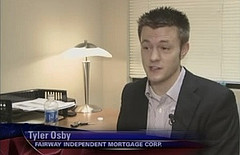I’ve always felt awkward defining this myself. That is why I’m happy to say, I found a great article on this subject! Recently on Inman Blog, Jack Guttentag (a great resource in my opinion) wrote about the differences between good and bad brokers.
Some key takeaways:
- Good brokers are like financial planners. Mortgages should fit properly into a household’s overall financial situation and goals.
Here’s what Jack had to say:
Good brokers are financial planners: Mortgages should fit properly into a household’s overall financial situation and goals, which often involves challenging questions. Here is an abbreviated list of some important ones:
- What is the best type of mortgage for this borrower?
- How much should the borrower put down?
- Should the borrower pay points or receive rebates?
- Should the borrower raising cash take a second mortgage or do a “cash-out” refinance?
- Should the borrower putting less than 20 percent down buy mortgage insurance, take lender-pay insurance at a higher rate, or take a piggyback second mortgage?
- Will it pay the borrower to refinance?
- Should the borrower consolidate other debts in a refinance?
- Should the borrower use available cash to pay down debt, pay points, or make a larger down payment?
There is no single conclusive test of a broker’s skills as a financial planner, but there are clues in how the broker responds to your questions regarding one or more of these or similar issues.
A good sign: The broker indicates what the answer to your questions depends on, e.g., whether you should pay points depends heavily on how long you expect to have the mortgage.
An even better sign: The broker indicates a specific analytical tool he will use to answer the question, such as a specific calculator or spreadsheet.
A bad sign: The broker gives you an answer right off the bat; see below.
Good brokers are good listeners: Every borrower brings a unique package of needs, capacities and preferences to the table. Unless the broker extracts this information at an early interview, the risk is high that the broker’s recommendations will not fit. The shrewd borrower can tell a lot about the broker from that interview.
A good sign: Before offering any opinions, the broker quizzes you about your financial status and plans.
A bad sign: The broker pretends to know what mortgage type you need, or the answer to any other issue that may be vexing you, without having first learned anything about you.
Good brokers will act in your interest in dealing with the lender and third parties. They will guarantee the lender fees first presented to you in the Good Faith Estimate, preventing any fee escalation. And they will seek out the best possible prices for third-party charges such as title insurance. Some brokers have special arrangements to pass on discounts to their clients, while others select providers who give brokers the best Christmas presents.
Ask if the broker guarantees that lender fees won’t be higher at closing.
Ask if title charges are competitive, and how the broker knows this.
Ask if the broker guarantees that third-party fees won’t be higher at closing.
A good broker operates transparently: The broker who keeps you in the dark is the one most likely to sacrifice your interests for his pay day.
Ask what the broker’s total fee will be, including any payments received by the lender, and if this will be put in writing.
Ask if the broker will give you a copy of the rate-lock statement as soon as it has been received from the lender.









